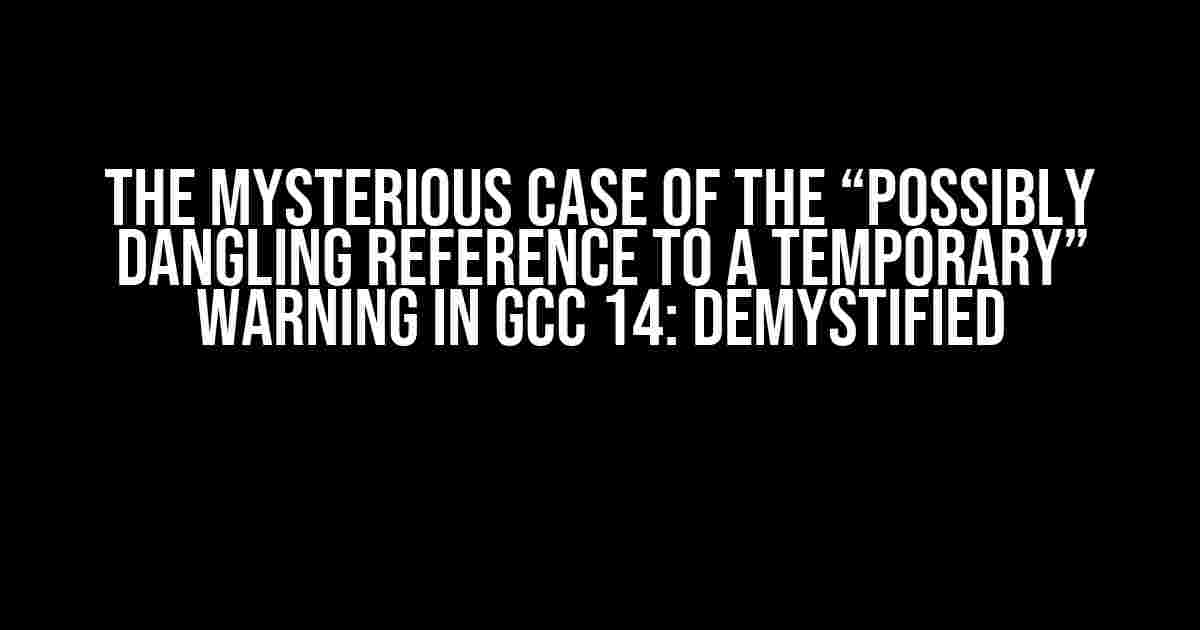Are you tired of receiving the enigmatic “possibly dangling reference to a temporary” warning in GCC 14? Do you find yourself scratching your head, wondering what it means and how to fix it? Fear not, dear reader, for we’re about to embark on a thrilling adventure to unravel the mystery behind this warning and provide you with a comprehensive guide on how to tackle it.
What is the “Possibly Dangling Reference to a Temporary” Warning?
The “possibly dangling reference to a temporary” warning is a compilation warning generated by GCC 14 when it detects a potential issue with references to temporary objects in your C++ code. But what does it really mean?
In C++, temporary objects are created when you use expressions that return objects, such as function calls or literals. These temporary objects are destroyed at the end of the full expression, which can lead to issues if you try to access them after their lifetime has ended.
The warning is triggered when GCC 14 suspects that you’re holding a reference to a temporary object beyond its lifetime, which can result in undefined behavior. This can lead to crashes, unexpected results, or even security vulnerabilities.
Example 1: A Simple Case
#include <iostream>
std::string foo() {
return "Hello, World!";
}
int main() {
std::string& ref = foo();
std::cout << ref << std::endl;
return 0;
}
In this example, the `foo()` function returns a temporary `std::string` object, which is then bound to a reference `ref`. The warning is triggered because the `ref` reference is kept alive beyond the lifetime of the temporary object returned by `foo()`. This is a classic case of a dangling reference.
How to Fix the Warning?
There are two primary ways to fix the “possibly dangling reference to a temporary” warning:
Method 1: Use a Local Variable
int main() {
std::string local = foo();
std::string& ref = local;
std::cout << ref << std::endl;
return 0;
}
In this approach, we create a local variable `local` to hold the return value of `foo()`. We then bind the `ref` reference to `local`, which is a named object with a well-defined lifetime. This ensures that the reference `ref` is not dangling.
Method 2: Use a Const Reference
int main() {
const std::string& ref = foo();
std::cout << ref << std::endl;
return 0;
}
By using a `const` reference, we extend the lifetime of the temporary object returned by `foo()` to match the lifetime of the reference `ref`. This is a convenient way to avoid the warning, as long as you’re not modifying the temporary object.
When is the Warning Not Triggered?
The “possibly dangling reference to a temporary” warning is not triggered in certain scenarios:
Scenario 1: Returning a Named Object
std::string foo() {
std::string namedObject = "Hello, World!";
return namedObject;
}
int main() {
std::string& ref = foo();
std::cout << ref << std::endl;
return 0;
}
In this case, the warning is not triggered because `foo()` returns a named object `namedObject`, which is not a temporary object. The reference `ref` is bound to a named object, which has a well-defined lifetime.
Scenario 2: Using a Move Constructor
class MyClass {
public:
MyClass(const std::string& str) : str_(str) {}
MyClass(MyClass&& other) : str_(std::move(other.str_)) {}
std::string str_;
};
MyClass foo() {
return MyClass("Hello, World!");
}
int main() {
MyClass& ref = foo();
std::cout << ref.str_ << std::endl;
return 0;
}
In this scenario, the warning is not triggered because the `foo()` function returns a `MyClass` object, which has a move constructor. The move constructor ensures that the temporary object is properly transferred to the `ref` reference, avoiding the dangling reference issue.
Best Practices to Avoid the Warning
To avoid the “possibly dangling reference to a temporary” warning, follow these best practices:
- Avoid returning references to temporary objects from functions.
- Use local variables or `const` references to hold temporary objects.
- Implement move constructors for your classes to ensure proper transfer of temporary objects.
- Use `std::move` to transfer ownership of temporary objects.
- Avoid using raw references in favor of smart pointers or `std::optional`.
Conclusion
The “possibly dangling reference to a temporary” warning in GCC 14 is not a myth, but a real issue that can lead to serious problems in your code. By understanding the warning, recognizing the scenarios that trigger it, and following the best practices outlined in this article, you can ensure that your code is safe, efficient, and elegant.
Remember, a well-crafted C++ program is a beautiful thing. Don’t let dangling references ruin the party!
| Scenario | Warning Triggered? |
|---|---|
| Returning a temporary object | Yes |
| Returning a named object | No |
| Using a move constructor | No |
| Using a const reference | No |
Frequently Asked Question
Are you getting the dreaded “possibly dangling reference to a temporary” warning in GCC 14? Don’t worry, we’ve got the answers!
What causes the “possibly dangling reference to a temporary” warning in GCC 14?
This warning occurs when the compiler detects that a reference might be referring to a temporary object that has already been destroyed. This can happen when you return a temporary object from a function and bind it to a reference. GCC 14 is more aggressive in detecting such cases, hence the warning.
Is the warning always issued, regardless of the function argument?
No, the warning is not always issued. It depends on the function argument. If the function argument is an lvalue (i.e., a named variable), the warning is not issued. However, if the function argument is an rvalue (i.e., a temporary object), the warning is issued.
How can I avoid the “possibly dangling reference to a temporary” warning?
You can avoid the warning by ensuring that the reference is bound to an lvalue instead of an rvalue. One way to do this is to use the `std::forward` function to forward the argument to the function, which can help the compiler to distinguish between lvalues and rvalues.
What are the consequences of ignoring the “possibly dangling reference to a temporary” warning?
Ignoring the warning can lead to undefined behavior, such as accessing memory that has already been freed. This can cause crashes, data corruption, or other unexpected behavior. It’s essential to address the warning and ensure that the reference is bound to a valid object.
Is the “possibly dangling reference to a temporary” warning specific to GCC 14?
No, the warning is not specific to GCC 14. Other compilers, such as Clang, may also issue similar warnings. However, GCC 14 is more aggressive in detecting such cases, which may result in more warnings being issued.


